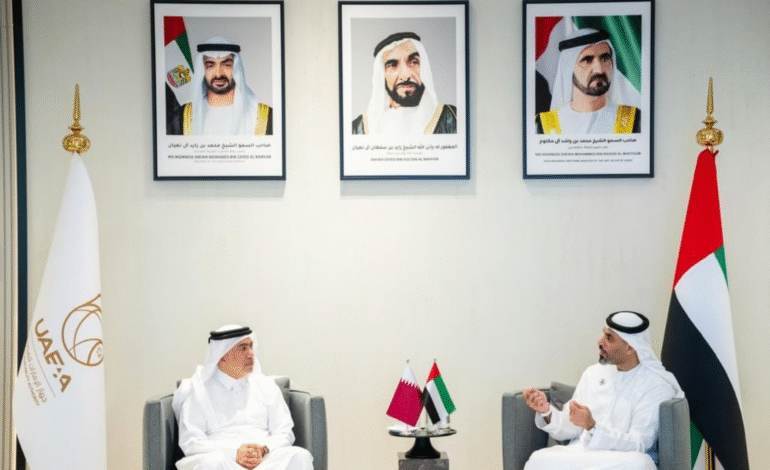UAE Expands Global Audit Ties with AI-Driven Oversight

The UAE continues to reinforce its position as a regional leader in governance, transparency, and financial oversight through a series of high-level meetings and strategic collaborations. Under the leadership of Humaid Obaid Khalifa Obaid Abushibs, President of the UAE Accountability Authority (UAEAA), the country has actively engaged with oversight authorities from Qatar, Portugal, Korea, Malaysia, and Saudi Arabia. These official visits and exchanges highlight the UAE’s commitment to establishing robust frameworks for accountability, innovation in audit practices, and the adoption of cutting-edge technologies like artificial intelligence (AI).
As part of ongoing efforts to elevate public sector integrity, these partnerships aim to foster institutional knowledge exchange, boost operational efficiency, and improve auditing systems, ultimately contributing to the protection of public resources and the promotion of sustainable development.
UAE-Qatar Dialogue: Advancing Gulf Cooperation in Audit Excellence
Recently, Humaid Obaid Khalifa Obaid Abushibs welcomed Abdulaziz Bin Mohammed Bin Ahmed Al Emadi, President of Qatar’s State Audit Bureau, to Abu Dhabi for a key official visit. The meeting, which included an accompanying Qatari delegation, was part of a broader Gulf Cooperation Council (GCC) initiative to enhance partnership and coordination in financial oversight and accountability.
During the discussions, both parties agreed on the importance of institutional knowledge-sharing and collaboration to elevate the effectiveness of auditing systems within the public sector. They explored avenues for improving audit practice efficiency and adopting innovative, tech-driven approaches to reinforce transparency and integrity in public administration.
One central theme of the meeting was the shared commitment to leveraging modern technologies, particularly artificial intelligence. These tools, both sides agreed, play a vital role in enhancing operational quality, enabling real-time data analysis, automating routine tasks, and ensuring a higher standard of accountability.
Additionally, the discussion stressed the need to develop national capabilities and intensify institutional coordination across Gulf nations. Strengthening such ties will not only foster mutual trust among GCC member states but also elevate the regional audit institutions’ credibility at the global level.
This visit marked a significant milestone in the UAE’s efforts to unify Gulf oversight systems and bolster cooperation to protect public wealth and resources while ensuring that financial practices meet international benchmarks.
Portugal Visit: UAEAA Expands Global Strategic Oversight Network
In January, UAEAA President Humaid Obaid Abushibs led an official delegation to the Republic of Portugal to enhance bilateral cooperation and explore best practices in governance and integrity.
This visit included high-level meetings with several senior Portuguese government officials and regulatory leaders, such as Filipa Urbano Calvão, President of Portugal’s Court of Auditors, and António Pires da Graça, Head of the National Anti-Corruption Mechanism. These discussions revolved around improving transparency mechanisms, sharing expertise in financial oversight, and reinforcing institutional accountability through collaborative efforts.
The UAEAA showcased its proactive approach to strengthening governance frameworks, focusing on modern regulatory systems and the integration of technology. Particular emphasis was placed on the Authority’s strategy of deploying digital tools and advanced analytics to support transparency and sustainability in national resource management.
The visit underscored the UAEAA’s long-term vision of creating an ecosystem of international audit partnerships. These partnerships aim to share global expertise, adopt efficient regulatory methods, and establish uniform standards of best practice in oversight and auditing.
Moreover, the trip provided a valuable opportunity for UAEAA officials to observe the Portuguese approach to tackling corruption and promoting integrity. In turn, this contributed to enriching the UAE’s strategies for building resilient institutions that are aligned with global governance standards.
Deepening Ties with South Korea: A Landmark Memorandum of Understanding
In October 2024, the UAEAA extended its global outreach by sending a delegation to the Republic of Korea. The visit resulted in the signing of a pivotal Memorandum of Understanding (MoU) between Humaid Obaid Abushibs and Choe Jaehyoeng, Chairman of the Board of Audit and Inspection (BAI) of Korea.
This MoU laid the foundation for stronger institutional cooperation between the two countries in the domains of public oversight, auditing excellence, and anti-corruption strategies. The agreement serves as a framework for ongoing exchanges of knowledge, audit methodology development, and coordination in governance innovation.
During the visit, the UAEAA delegation met with other prominent Korean officials, including Ryu Chul Whan, Chairperson of the Anti-Corruption and Civil Rights Commission. These meetings offered insights into Korea’s advanced anti-corruption frameworks and citizen engagement tools, contributing to a deeper understanding of integrated governance.
Both sides acknowledged the mutual benefits of such partnerships, particularly in a world increasingly reliant on transparency and accountability. The UAEAA reaffirmed its readiness to implement innovative strategies and improve institutional performance through joint learning and international cooperation.
This visit further reinforced the UAE’s strategic goal of becoming a global hub for public sector governance, where advanced technologies and best practices converge.
UAE-Malaysia Collaboration: Building Audit Talent and Technological Integration
Continuing its global outreach, the UAE Accountability Authority engaged in strategic dialogue with Malaysia’s National Audit Department. During the official visit, UAEAA President Humaid Obaid Abushibs met with Datuk Wan Suraya Wan Mohd Radzi, Auditor-General of Malaysia.
The two leaders explored avenues for enhancing bilateral cooperation in audit-related fields, particularly in capacity-building and the development of data-driven oversight systems. Both sides discussed their respective roles, powers, and areas of jurisdiction, delving into how national systems could benefit from shared tools, methodologies, and oversight philosophies.
The Malaysian side introduced the UAEAA delegation to the National Audit Academy Malaysia—a center of excellence for training government auditors. The academy’s structured programs and professional faculty were highlighted as models for developing skilled audit professionals capable of addressing the complex challenges of modern governance.
The meeting also emphasized the mutual benefit of exchanging audit technologies and best practices, including data analytics, risk assessment systems, and integrity evaluation tools. UAEAA outlined its own efforts to integrate artificial intelligence into audit procedures and enhance predictive capabilities for fraud detection and financial anomalies.
By focusing on talent development and innovation, this partnership aligns closely with the UAE’s broader strategy of building governance systems that are not only effective but future-ready.
Strengthening Oversight Integration with Saudi Arabia
The UAEAA’s collaboration efforts extended to neighboring Saudi Arabia, where a delegation led by Humaid Obaid Abushibs engaged with the Oversight and Anti-Corruption Authority (Nazaha) and the General Court of Audit.
The visit underscored the UAEAA’s strategic intent to work closely with Gulf partners in the harmonization of audit frameworks and the alignment of accountability standards. Meetings with Saudi officials allowed both parties to exchange experiences in areas such as digital audits, resource protection, and anti-fraud initiatives.
This visit also demonstrated the UAE’s dedication to enhancing GCC-level cooperation in regulatory affairs. By aligning national strategies with regional partners, the UAEAA is contributing to the unification of audit efforts aimed at optimizing resource management and achieving the long-term goals of the Gulf region’s economic and governance strategies.
Saudi Arabia’s audit institutions also showcased their latest initiatives, from digital integration in public oversight to citizen-centered transparency mechanisms. The UAEAA delegation expressed admiration for Saudi Arabia’s progress and emphasized the importance of continuous cooperation and knowledge-sharing.
Promoting AI-Driven Audit Systems and Regional Innovation
One of the most significant themes recurring across all of UAEAA’s recent partnerships is the integration of artificial intelligence and digital technologies into the audit process. Whether in Portugal, Korea, Malaysia, or the Gulf region, AI is emerging as a common denominator in modern oversight innovation.
The UAEAA’s approach combines advanced technologies with human expertise, ensuring that audit professionals can work alongside AI tools to detect irregularities, flag anomalies, and ensure compliance across public sector operations. This hybrid model promises not only greater efficiency but also enhanced transparency and accountability.
Through its strategic partnerships, the UAEAA continues to explore new opportunities to automate manual processes, deploy predictive analytics, and improve audit response times. These tools are especially critical in safeguarding public funds and ensuring ethical governance in an increasingly complex financial landscape.
Moreover, these collaborations serve as an important vehicle for continuous learning, allowing the UAE to remain at the forefront of technological advancements in oversight and compliance.







